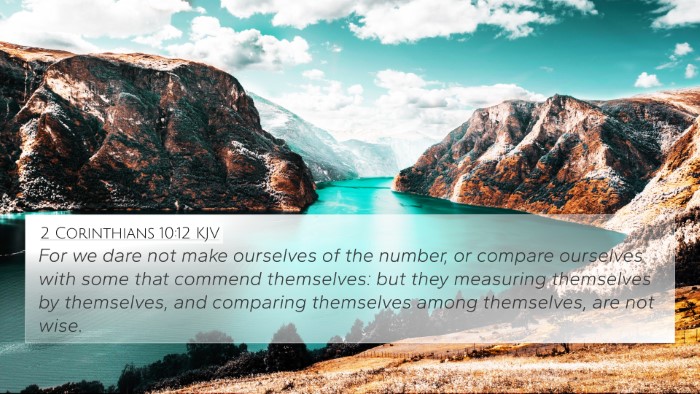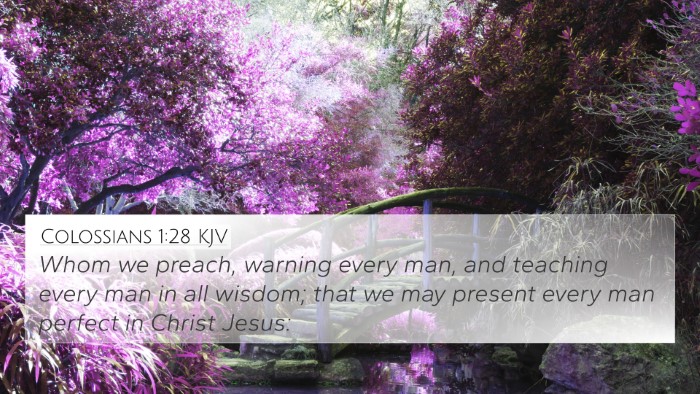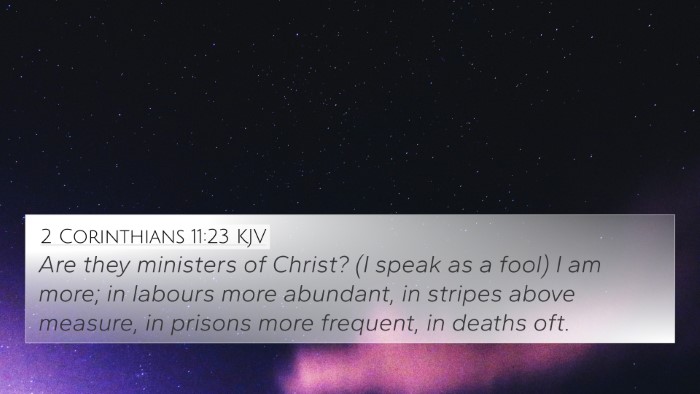Understanding 1 Corinthians 15:10
1 Corinthians 15:10: "But by the grace of God I am what I am: and his grace which was bestowed upon me was not in vain; but I laboured more abundantly than they all: yet not I, but the grace of God which was with me."
Summary of Meaning
This verse reflects the profound realization of Paul concerning the transformative power of God's grace in his life. Paul emphasizes that his identity and achievements are solely attributable to God's grace. Additionally, he acknowledges that his hard work in spreading the Gospel is a result of divine assistance rather than personal merit. The verse encapsulates themes of grace, labor, and divine empowerment.
Commentary Insights
-
Matthew Henry:
Henry explains that Paul's affirmation of grace serves as both a personal testimony and a theological statement. The transformation from persecutor to apostle illustrates the unmerited favor of God, which allows sinners to become participants in God's redemptive plan. His labor, despite seeming remarkable, was empowered by the grace of God, demonstrating that human endeavors in spirituality must rely on divine strength.
-
Albert Barnes:
Barnes highlights the importance of grace in Paul's apostolic identity. He points out that the phrase "I am what I am" illustrates an inherent humility. All of Paul’s accomplishments in ministry stem from God's grace rather than his own qualifications. Barnes stresses the unity of grace and labor; the greater the grace, the greater the responsibility to labor diligently.
-
Adam Clarke:
Clarke provides an in-depth analysis of Paul's declaration regarding labor. He notes that Paul's effort contrasts with others, but ultimately recognizes that his power comes from God. This highlights a theme of collaborative participation in divine work. Clarke emphasizes that recognizing God’s grace leads to genuine faithfulness in service and ministry.
Cross-References
The following verses conceptually link with 1 Corinthians 15:10, showcasing the themes of God's grace and Paul’s labor:
- Ephesians 2:8-9: "For by grace are ye saved through faith; and that not of yourselves: it is the gift of God." This emphasizes grace as a foundational element of salvation.
- Galatians 2:20: "I am crucified with Christ: nevertheless I live; yet not I, but Christ liveth in me: and the life which I now live in the flesh I live by the faith of the Son of God, who loved me, and gave himself for me." This illustrates life through Christ’s empowerment.
- 1 Timothy 1:12-14: "And I thank Christ Jesus our Lord, who hath enabled me, for that he counted me faithful, putting me into the ministry; who was before a blasphemer, and a persecutor, and injurious: but I obtained mercy." This underscores transformation by grace.
- 2 Corinthians 12:9: "And he said unto me, My grace is sufficient for thee: for my strength is made perfect in weakness." This promotes reliance on grace in times of weakness.
- Philippians 4:13: "I can do all things through Christ which strengtheneth me." This aligns with the theme of divine strength in labor.
- Titus 2:11: "For the grace of God that bringeth salvation hath appeared to all men." This highlights grace as a universal theme in the Christian message.
- Romans 12:6-8: "Having then gifts differing according to the grace that is given to us..." This speaks to the diversity of gifts and the role of grace in their operation.
- 1 Peter 4:10: "As every man hath received the gift, even so minister the same one to another, as good stewards of the manifold grace of God." This encourages mutual service empowered by grace.
- Romans 15:15-16: "Nevertheless, brethren, I have written the more boldly unto you in some sort, as putting you in mind, because of the grace that is given to me of God, that I should be the minister of Jesus Christ to the Gentiles." This further confirms Paul's understanding of his apostolic mission as a grace-defined calling.
- Hebrews 12:28: "Wherefore we receiving a kingdom which cannot be moved, let us have grace, whereby we may serve God acceptably with reverence and godly fear." This emphasizes serving through the grace we've received.
Thematic Connections
1 Corinthians 15:10 is rich in themes of grace, labor, and identity in Christ. By examining these themes, we can discover:
- The Power of Grace: Understanding how grace empowers and transforms individuals for service and ministry.
- Identity in Christ: Recognizing how one's identity as a believer shapes one's actions and responsibilities.
- The Call to Labor: Encouraging believers to actively participate in God's mission, fueled by divine grace.
- Humility and Service: Highlighting the importance of humility when acknowledging that all achievements are due to God's grace.
- Collaborative Effort: Understanding the partnership between God’s grace and human effort in fulfilling one's calling.
Using Cross-References Effectively
For those seeking to explore the Bible further, employing a Bible concordance can aid in identifying bible verse cross-references effectively. Understanding connections between Bible verses can deepen one's faith and understanding through thematic Bible verse connections. Here are a few tools for your study:
- Utilize a cross-reference Bible study guide for structured study.
- Employ a Bible reference resource to uncover Bible verses that relate to each other.
- Explore detailed cross-reference between Gospels to enrich narrative understanding.
- Consider comprehensive Bible cross-reference materials for in-depth study.
Conclusion
1 Corinthians 15:10 serves as a powerful reminder of the essential nature of grace in the life of believers. By integrating commentaries and cross-references, one can appreciate the interconnectedness of scripture and gain deeper insights into God’s grace and our corresponding labor. This verse encourages not only reflection on grace but also inspires action in living out one's faith with diligence and humility, demonstrating the profound impact of God's grace in transforming lives for His glory.






















